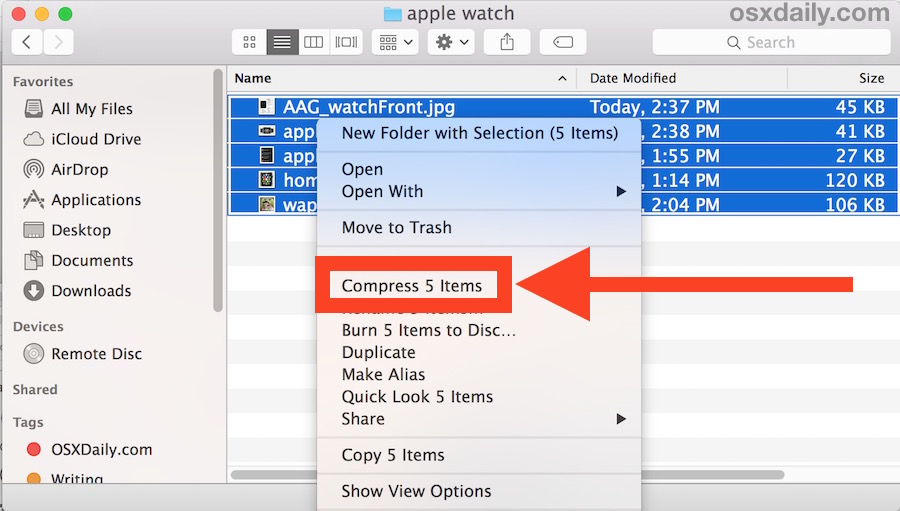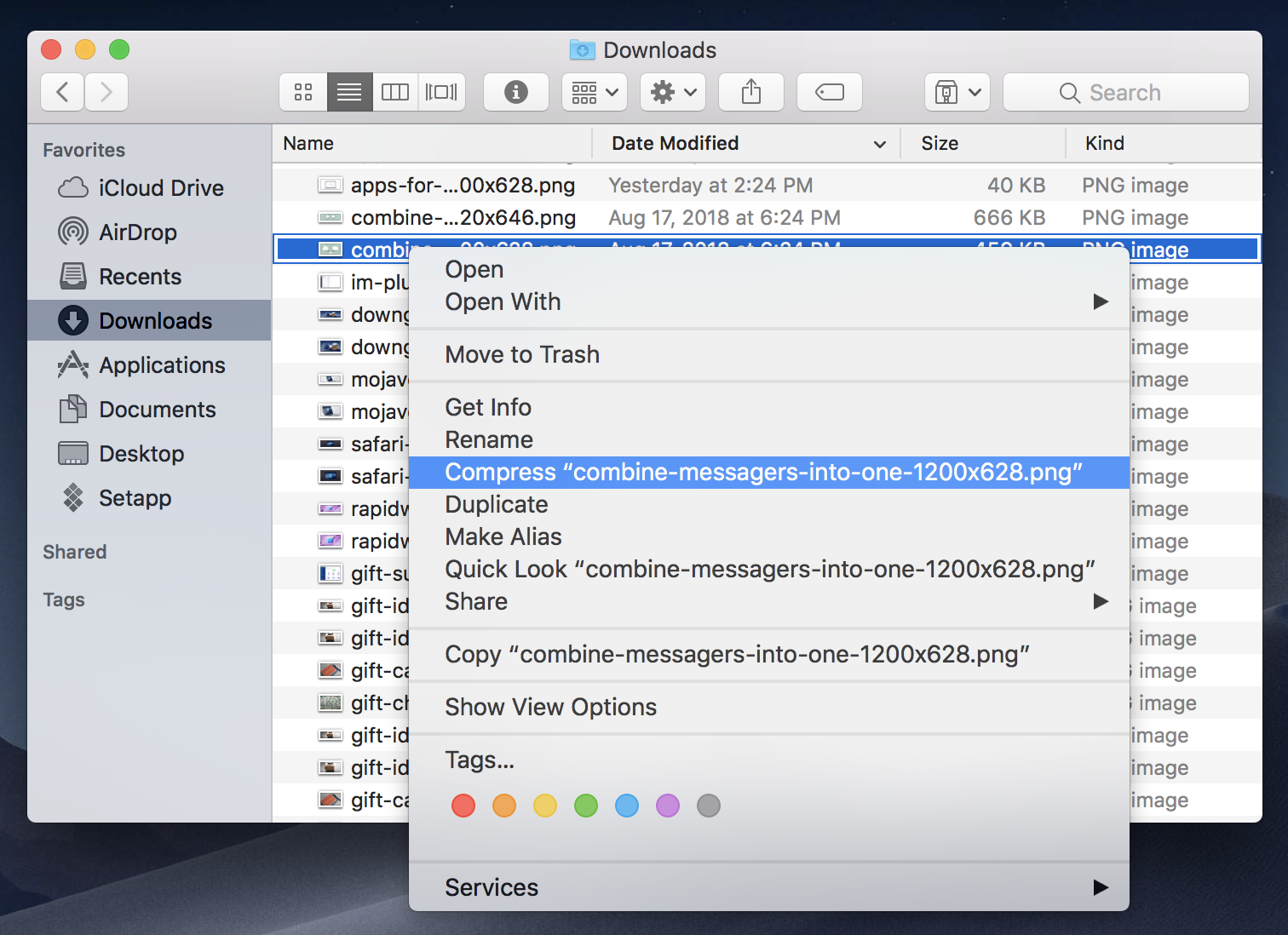- Make Zip File On Mac
- Extract Multiple Zip Files Machine
- Unzip Software For Mac
- Extract Multiple Zip Files Mac Pro
General Information About ZIP Files
Apr 05, 2021 B) Manually re-combine and then unzip the single ZIP file using the Terminal.app. Open the Terminal.app from Applications » Utilities. Use the following command, adjusted to your needs and ZIP-file location (s): zip -s 0 /Downloads/ splitted-zip.zip -out /Desktop/ singlefile-filename.zip. Once you have created the single ZIP-file, use the. Open the Files app, then choose a location like On My iPhone or iCloud Drive. Tap the more button, then tap Select. Choose one or more files. Tap the more button in the lower right, then tap Compress. If you selected one file, a ZIP file with the same filename saves to that folder. If you selected multiple files, a ZIP archive named Archive. How to Zip a File on Mac. Open a Finder window, then locate the file or folder you want to zip. Right-click on the said file or folder. Select 'Compress' in the drop-down menu you see. The file is then Zipped while the original is left just the way it was. How to Create Zip Files and Folder on Mac. Open a Finder window. Download WinZip (Windows or Mac)or Download WinRar for Windows. Extract the.zip file. Right-click the.zip file and choose WinZip Extract to here or Extract Here with Winrar. The contents of your bulk download will be extracted to the folder you are in. There is no need to click the.z01 or.z02 files. Viewing the content of the bulk. The Unarchiver can open zip archives as well as open RAR files on a Mac, zip CPGZ files, bz2 bzip,.7z files,.sit, gzip gz, tar, and many other file archive formats that you may encounter when downloading data from the internet or in emails. That vast support for extracting a wide variety of file types is one of the many reasons why The.
ZIP files are compressed archives that group together one or more files into a single file, compressing the files (making them smaller) that are contained inside. The ZIP file format is very popular for efficiently storing and transferring groups of files in a variety of business and personal applications.

The ZIP file format dates to the late 1980s when it received heavy use in pre-internet-era Bulletin Board Systems, or BBSes. In this era, file transfers occurred using MODEMs and transfer speeds were very limited. Using ZIP compression regularly saved minutes or even hours off of file transfers. It also allowed for multiple files and folders to be grouped together ('zipped') and transferred as a single ZIP file. Once received, the ZIP file would then be opened and its contents decompressed ('unzipped') onto a user's computer.
Today, the ZIP file format remains in heavy use in the internet and in the cloud, with billions of such files in circulation. In the cloud, ZIP files are commonly found as both Gmail attachments, as well as files stored in Google Drive or other cloud-based storage systems such as Dropbox and Microsoft OneDrive.
In addition to compression, ZIP files are archives that can group together multiple files and folders. When this is done, the path and folder information of the file tree is preserved inside the ZIP file. This makes the ZIP file format convenient for sharing and distributing groups of files.
Examples of ZIP File Uses
ZIP files are common across a variety of business areas, including industries ranging from medical, insurance, legal, mortgage, banking and financial, scientific, equities and trading, SEO (Search Engine Optimization), and education industries.
Here are some specified real-world examples of actual usage of ZIP files:

- A car insurance agent ZIPs and emails information related to a person's health insurance, homeowner's insurance, auto insurance, or life insurance policy.
- A real estate agent scans and ZIPs a sales contract and sends it to a mortgage broker for a home loan when buying a home.
- An attorney or lawyer for a law firm ZIPs together a set of related legal documents such as a will, trust, claim, or other estate planning documents and shares them with their client.
- A university student ZIPs a homework assignment and related files and sends it to their instructor or professor in an online degree program.
- A tax accountant ZIPs and emails a copy of a person's federal and state tax returns for review before filing with the IRS.
ZIP files can contain multiple files of different types. Common files that can be included in a ZIP archive include PDFs, images, videos, and Microsoft Office documents including Microsoft Word, Microsoft Excel, and Microsoft PowerPoint (*.DOCX, *.XLSX, *.PPTX file formats).
Creating and Opening ZIP Files
ZIP Extractor and most modern operating systems have built-in functionality to create ZIP files.
Make Zip File On Mac
- On Windows or PC, to create a ZIP file, right-click files in Windows Explorer and select “Send to -> Compressed (zipped) Folder.”
- On a Mac running Mac OS, create a ZIP file by right-clicking files in Finder and select 'Compress [name_of_file].”
- On a Chromebook running Chrome OS, choose one more files in the Files app and then select “Zip selection.”
- In ZIP Extractor, click 'Create New ZIP' and from there you can add files and folders to be compressed, including files from Google Drive. You can also drag-and-drop files and folders onto the main screen to ZIP them.
- In your internet browser, you can also use the URL shortcut zip.new to go directly to the ZIP Extractor 'Create New ZIP' screen.
On Windows, Mac, or Chrome OS, a ZIP file can be extracted (decompressed) by double-clicking it. Then, the individual files will be unzipped into a new directory and available to preview, edit, print, etc.
ZIP Extractor provides the same decompression functionality that standard operating systems provide, except that ZIP Extractor supports many more formats than the basic built-in functionality of most ZIP programs. Most importantly, ZIP Extractor is designed bottom-up to work directly in the cloud. Because there is no built-in ability to unzip ZIP files in Google Drive or Gmail, ZIP Extractor is a third-party application that provides this functionality.
Encryption and Password Protection
The ZIP file format provides support for basic password-protected ZIP files. More recently, the ZIP format was enhanced with the ability to create files with strong encryption, using AES (Advanced Encryption Standard). This 'strong encryption' approach is much more secure than the original version, but it is less compatible because Windows and Mac cannot open them. ZIP files using 'strong encryption' require ZIP Extractor, WinZip, or other more advanced program to open.
Extract Multiple Zip Files Machine
Other archive formats, including RAR and 7-Zip, also allow passwords. These formats have a special ability to also encrypt the names of the files contained in the archive file (using the supplied password), in addition to file content.
Unzip Software For Mac
ZIP Extractor has full support for opening ZIP, RAR, and 7-Zip files with all types of passwords and encryption formats. It can also create ZIP files with both the standard encryption (compatible with Windows and Mac) or 'strong encryption' (requiring ZIP Extractor or WinZip to open).
WinZip® makes it easy to create Zip files (.zip or .zipx) that are split into smaller pieces of a size that you specify. There are several reasons why you might want to do this, such as:
- To assist with large downloads. Some users may have difficulty downloading very large Zip files from web sites, FTP sites, etc. You can use the split Zip feature to break large files into smaller pieces that can be downloaded separately.
- To overcome email size limits, as an alternative to sharing the Zip file to the cloud. Some email systems limit the size of attachments. If you want to email a large Zip file that exceeds your limit, sharing is usually the easiest solution, but, if that is not an option, you can also split the Zip file into smaller parts and email them separately.

To split an existing Zip file into smaller pieces
If you have an existing Zip file that you want to split into multiple pieces, WinZip gives you the ability to do that.
Extract Multiple Zip Files Mac Pro
Using the WinZip Ribbon interface
- Open the Zip file.
- Open the Settings tab.
- Click the Split dropdown box and select the appropriate size for each of the parts of the split Zip file. If you choose Custom Size in the Split dropdown list, the Custom Size (MB) field will become active and allow you to enter in a custom size specified in megabytes.
- Open the Tools tab and click Multi-Part Zip File.
- In the Split window, browse to the location where you want to create the new split Zip file.
- Type in the file name for the new split Zip file in the File name box.
- Click OK.
- WinZip will create your split Zip file using the size you specified in step 3 as the maximum size for each part. The result will be one file with a .zip or .zipx extension, and additional files with numeric extensions: .z01 or .zx01, .z02 or .zx02, etc.
To create a new split Zip file
You can create a new split Zip file with the WinZip submenu of the context menu.
- Open WinZip and follow steps 2 and 3 above (unless you know the size is set as you want it already).
- Highlight the file(s) and/or folder(s) you want to use to create a split Zip file in Windows Explorer or on the Desktop.
- Right click in the highlighted area and choose Create a Split Zip File from the WinZip submenu of the context menu.
- In the window that opens, change the file name and the destination if you wish, and choose other options, then click Create.
Notes
- Each of the segments of the split Zip file will have a different extension. WinZip creates files with names like Data.z01 or Data.zx01, Data.z02 or Data.zx02, and so on, except for the very last segment of the new Zip file. The last segment will always have either the .zip or .zipx extension, respectively, based on the compression method used when creating the Zip file (e.g., Data.zip, Documents.zipx).
- To open the split Zip file, open the file with the .zip or .zipx extension. Don't try to open any of the files with the numbered extensions; WinZip won't recognize them as Zip files.
- Once the split Zip file has been opened, you can work with it much as you would work with a regular Zip file, except you can't add any new files or remove existing files. Some operations such as creating self-extracting Zip files and editing comments are also disabled for split Zip files.
- The sizes listed as 1.2MB, 1.44MB, and 2.88MB are approximate. The segments of the split Zip file are sized appropriately to fit on media of the specified size. You cannot, however, use decimal points when specifying sizes in the Other size field.
- The split Zip file format is an extension of the Zip 2.0 specification. Therefore, some Zip utility programs may not be able to open split Zip files. Please see Split Zip file compatibility information for more details.